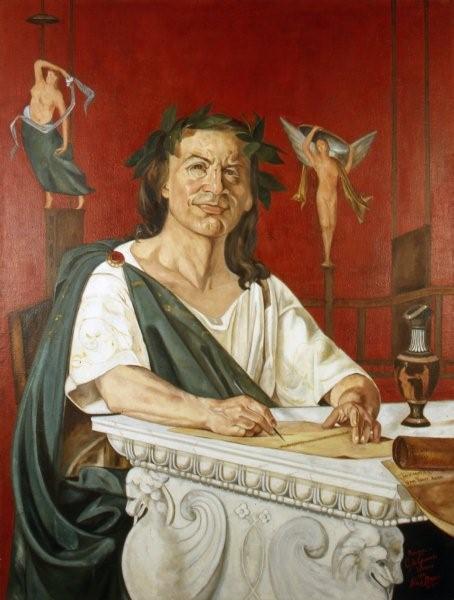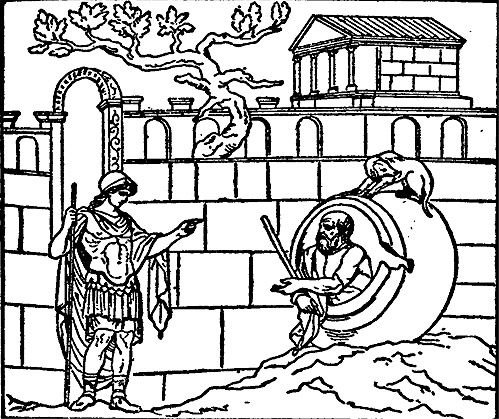
The Cynic did not regard anything as inherently evil. A thing became evil only when a man allowed himself to become enslaved by it. The Cynic's objections to pleasure were not based on moral grounds. But the pursuit of pleasure and the acquisition and ownership of property were regarded as indications that a man was not free. The Cynic demonstrated his freedom, apathy and indifference by his idleness (Dio Chrysostom 6, 30).
The word ἀδοχία ordinarily signified dishonor or disrepute but the Cynics gave it different meanings. They sometimes used it to express the absence or negation of φἴλότιμία or φιλοδοξία (love of honor or reputation). "We are already free from riches but love of honor does not yet free us from slavery, although, by Hercules! we are doing everything to be released from it. I will free myself from this also" (8th Letter of Crates). Δόξα ordinarily meant opinion and the Cynics expressed disregard or contempt for the opinions of other men. "If you are good you do not grieve over evil things which are said… For this is all opinion, to be a slave to good and ill reputation, and this is in shadows- as they say, in names, the most grievous of all. Try therefore to despise these things" (16th Letter of Crates). "You are not fighting against truth but against opinion… It is fine to wage war against such things" (10th Letter of Diogenes).
Contempt of the opinions of others, like freedom of speech, was a manifestation of the Cynic idea of freedom. Since laws were made by men and might have been other than what they were, and since customs varied in different countries, the Cynics held that laws and customs had no validity. They did not consider that the mere fact that observances were required by law or custom gave them a moral validity. The Stoics did not follow the Cynics in this respect, for their standards of practical ethics were based on local laws and customs and they recognized obligations to the family and state. The Stoics practically returned to the position of Socrates, who taught obedience to law and compliance with local customs. "Socrates, in all exercises of devotion and piety, confined himself altogether to what he saw practiced by the republic, and to his friends he constantly advised the same thing, saying it only savored of vanity and superstition in all who did otherwise" (Xenophon, Mem. Soc. 1, 3, 1). A Cynic scoffed at the customs of others but was strict in compliance with his own. He would not appear anywhere without his conventional wallet, staff and his cloak, which must invariably be ragged and worn. He wore his cloak so as to leave one shoulder bare and he never wore shoes. Horace says that the Cynic "will shun the cloak wrought at Miletus with greater aversion than dog or viper; he will die with cold unless you restore him his ragged garment" (Epistles 1, 17).
Image: Horace, portrayed by Giacomo Di Chirico
Public Domain via Wikimedia Commons
Other Posts in the Diogenes of Sinope series
The Cynics Referred to the Habits of Animals
Slump towards Animalism
Attitude of the Cynics Towards Pleasure
Happiness Did Not Exclude Pleasure
Diogenes as Hedonist
Short Road to Happiness or Short Cut to Virtue?
Despising Pleasure is Pleasurable
What is Virtue for a Cynic: Cats for Thievery
What is Virtue for a Cynic: Promiscuous Sexual Intercourse
The Cynic Sought Freedom
Labor Did Not Enter into the Cynic Scheme of Life
The Easy Life of the Cynic
The Cynic was Fond of Comparing Himself with Kings and Emperors
The Object of the Cynic was Happiness
I Am a Citizen of the World
Freedom of Speech is the Most Beautiful Thing in the World
An Excess of Infamy
I Speak Plainly as an Interpreter of Apathy
A Man Should Live Contented with Present Things
Contempt of the Opinions of Others
Download the entire Part One of Diogenes of Sinope for $2 STB

I love reading about ancient philosophy. I am more of a stoic, but I think the cynics are onto some things.
Downvoting a post can decrease pending rewards and make it less visible. Common reasons:
Submit
I studied Ancient Greek for two very difficult years! I like the way this book references so many ancient philosophers. It gives me the opportunity to link through to numerous ancient writers. Farrand Sayre (the author of this public domain book) was critical of the Cynics. The Cynic school is forgotten and discredited now (and overshadowed by the Stoics) but was influential for a long time.
Downvoting a post can decrease pending rewards and make it less visible. Common reasons:
Submit
It always fascinated me how the problems that philosophers discussed 2 thousand years ago are still being discussed today. I also find their positions more reasonable than the ones we have today.
Take the bit about human laws being arbitrary, for example. When one accepts this idea, all this talk about "human rights" is nothing but hilarious fantasy.
Downvoting a post can decrease pending rewards and make it less visible. Common reasons:
Submit
Congratulations! This post has been upvoted from the communal account, @minnowsupport, by roomerkind from the Minnow Support Project. It's a witness project run by aggroed, ausbitbank, teamsteem, theprophet0, someguy123, neoxian, followbtcnews/crimsonclad, and netuoso. The goal is to help Steemit grow by supporting Minnows and creating a social network. Please find us in the Peace, Abundance, and Liberty Network (PALnet) Discord Channel. It's a completely public and open space to all members of the Steemit community who voluntarily choose to be there.
Downvoting a post can decrease pending rewards and make it less visible. Common reasons:
Submit
This post has received a 0.39 % upvote from @drotto thanks to: @banjo.
Downvoting a post can decrease pending rewards and make it less visible. Common reasons:
Submit